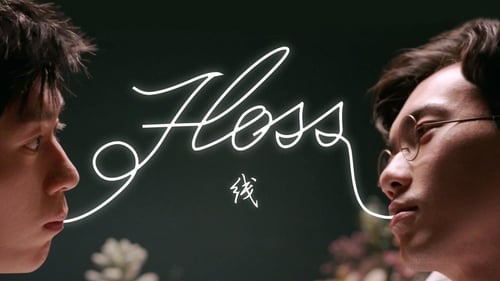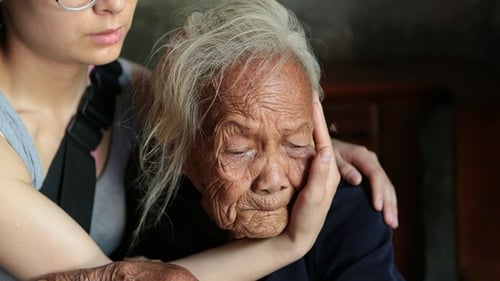对看 (2015)
ジャンル :
上映時間 : 2時間 32分
演出 : Yun Ye
シノプシス
Look Love closely follows the lives of two families living in completely different environments in order to show the gap in education and in region, the biggest social issue in present day China.

Xuan is a young man working in the film industry in Beijing. To make a documentary film that he wants to present at international festivals, he decides to take advantage of the holidays of the Day of the Dead to return to Chengdu, his hometown located at the other end of the country. The documentary he is about to make is about his relationship with his own lover. He leaves for Chengdu, accompanied by another man, Bo, the cameraman of the film. The two men take the train to Chengdu where Hong, Xuan's lover, is waiting for them. From the first moment of their arrival at the station, Xuan and Bo begin to turn with their camera, Xuan having already explained to Bo what he wanted to film and that Hong would always be "playing", Bo then trusting in Xuan. But Hong is more and more opposed to this camera and the presence of Bo.

ティンは新しい恋人のマークの“歯”にフェティッシュなまでの強い性的魅力を感じていた。ティンはマークにこのことを打ち明けたいと思っているが…。

Filmed over three years on China’s railways, The Iron Ministry traces the vast interiors of a country on the move: flesh and metal, clangs and squeals, light and dark, and language and gesture. Scores of rail journeys come together into one, capturing the thrills and anxieties of social and technological transformation. The Iron Ministry immerses audiences in fleeting relationships and uneasy encounters between humans and machines on what will soon be the world’s largest railway network.

In 1946, Heidi is entrusted to a Swiss family by her father. He will never come back for her. Today, François Yang questions his mother about her past. What follows is a journey to China, a quest to reconstruct memory. Through contact with her brothers and sister, Heidi measures the extent of the drama experienced by her family that remained in China, persecuted by the Communist Party.

A policeman investigates an introverted signal-station manager suspected of raping a hotel clerk.

Coming back to her broken family, pregnant writer Huang Xiaoyu and her French husband, Benjamin, finds herself trapped between her cult brainwashed mother, Li Jiumei, and her secretly homosexual father, Huang Tao.

The movie follows two unfortunate secret lovers who are constantly looking for a solution to their situation. Both of them are always arguing over their relationship. One day they went to a trip out of the city, into the outskirt. They hope they can solve their problems or at least escape them temporarily. They don’t have a solution, and they don’t understand why they are together. One thing that keeps them together is their love and care for each other. This is the second part of James Lee’s Love Trilogy which takes another look at unfaithfulness or rather faithlessness.

Before the Flood is a study of the final weeks of a dying city, as thousand-year-old Fengjie on the Yangtze River is reduced to rubble and its inhabitants uprooted to make way for the new Three Gorges Dam that will flood the entire valley.

A soon-to-be first-time voter, the filmmaker’s thought-provoking journey into the Rust Belt and South captures four Asian American voters’ ardent first time grassroots political participation ignited by the 2016 rise of “Chinese Americans for Trump.” FIRST VOTE is a character driven cinema verité style film chronicling the democratic participation of four Asian American voters from 2016 through the 2018 midterm elections.

A highway is waiting to go through a quiet village in Hunan, a province in central China where Mao was from. Due to the high cost of construction, construction companies and migrant workers who live on road work rush to here like the tide. In the following four years, they root in this strange place for interests, paying sweat and blood, even their lives. With their arrival, local village and peasants are forced to change their lives. Many hidden interest lines and hidden rules about road construction of the nation are unveiled, together with the shocking truth and emerging secrets.

A microcosm of China past and present flows through Xu Tong’s intimate docu “Shattered,” in which the maverick indie filmmaker continues to refine his techniques and concerns shown in his previous “Wheat Harvest” and “Fortune Teller.”

The little-known Hunan Suining County is an ordinary but full of magical places. As the theoretical point of the rocket wreckage launched by the Xichang Satellite Launch Center, it has greeted the rocket wreckage from the sky dozens of times in the past 20 years since 1990. This mysterious and dangerous “out-of-town visitor” broke the poor and peaceful life of the 160,000 locals in the jurisdiction. 2008 is China's "Olympic Year" and "Aerospace Year." The people of Suining, like the people of the whole country, are looking forward to the Olympics to pay attention to the Olympics and are proud of the growing strength of the comprehensive national strength including aerospace strength. They also have to bear the fate of falling from the sky.

China marks the beginning of the extensive Asian theme in Ottinger’s filmography and is her first travelogue. Her observant eye is interested in anything from Sichuan opera and the Beijing Film Studio to the production of candy and sounds of bicycle bells.

Fu-Jia the farmer grows lemons on a riverside flood-land. He borrowed a camera in 2009, saying that he would make a documentary on why the market price for lemons remains low. Not even a month later, Typhoon Morakot caused havoc in Taiwan, resulting in the largest flood in 50 years. Fu-Jia then documented the devastation with his camera. Upon learning Fu-Jia's story, we decided to make a documentary entitled "Fu-Jia's Home Movie" –about the man who has been making a documentary.

Xingxi travels alone to Alor Setar, a town in Northern Malaysia. As a consequence of a blown tire, she experiences three variant adventures. She introduces herself to people using different identities with mysterious secrets. In return, what the journey brings her is thoroughly unexpected. In the first adventure, Brooke is a traveler; in the second adventure, Brooke is an anthropologist; in the third, Brooke is a divorcée. She is a disheartened woman who comes across a French writer named Pierre. The two lonely travelers become instant friends. Their age gap enables them to have their respective insights into life and death. Meanwhile, it is not until the enigmatic side of Alor Setar begins to unfold that Brooke tells Pierre the true reason why she has come. They seek to understand the interaction between love and life. As the story comes to an end, mother nature shows her beauty with the magical Blue Tears phenomenon on prominent display.

In 1994, the oil-rich city of Karamay in Northwest China was the site of a horrible fire that killed nearly 300 schoolchildren. The students were performing for state officials and were told to stand by while the officials exited first. After the fire, the story was heavily censored in the Chinese state media. To this day, the families of Karamay have not been allowed to publicly mourn their children.

Follow the lives of the elderly survivors who were forced into sex slavery as “Comfort Women” by the Japanese during World War II. At the time of filming, only 22 of these women were still alive to tell their story. Through their own personal histories and perspectives, they tell a tale that should never be forgotten to generations unaware of the brutalization that occurred.

A documentary film showing the life of Niu Hongmiao, a 20-year-old country girl who is now a prostitute in Beijing. Around the time of wheat harvesting, she goes back home to Dingxing County, Hebei Province to visit her parents.

Yu Guangyi's stunning debut explores a grueling winter amongst loggers in Northeast China as they employ traditional practices through one last, fateful expedition. For generations, the lumberjacks of Heilongjiang, China have made their living harvesting timber amidst a barren, wintry landscape. These woodcutters confront the elements, living in makeshift cabins surrounded by snow and ice. Hand tools, sleds and horses are the only technology they employ to drag massive trees down the perilous slopes of Black Bear Valley. At constant risk of injury and death, they attempt to appease the mountain gods with ancient rituals and sacrifices. Despite their heroic efforts to subsist, the deforestation caused by their decades-long customs may lead to their ultimate demise.

A poet's rhapsody of doom.













